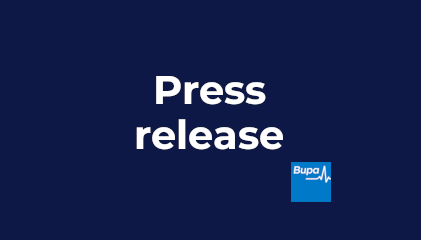- Eight out of ten people have experienced potential symptoms of poor mental health in lockdown, yet almost half haven’t told anyone
- And those with symptoms plan to delay seeking medical help for nearly 50 days or until things are ‘back to normal’
- Mental health experts at Bupa UK urge people not to delay

A new study from Bupa UK shows that the vast majority of UK adults (82%) have experienced symptoms that may indicate poor mental health such as continuous low mood, anxiousness, low self-esteem or hopelessness while in lockdown, yet almost half (44%) haven’t told anyone. This shows a sharp rise from 2019 when just one in five (22%) felt they had to bottle their feelings up.1
Waiting for things to return to normal
Despite high rates of poor mental health during the pandemic, just one in 20 people (5%) has spoken to a health professional about their symptoms. And concerningly, almost half (45%) say they will not seek medical help in the future. Others plan to wait almost two months (49 days) before coming forward – and one in five say they’re planning to wait until things are “back to normal”.2
Rather than confide in others about their mental health, many people have felt under pressure to ‘grin and bear it’ (43%), while others feel that now isn’t the time to make a fuss about mental health (23%) when the country is in crisis.
There’s particular concern over baby boomers, who plan to delay seeking help the longest - 65 days - despite experiencing symptoms, and women, who will delay 15 days longer than men.3
Mental health experts at Bupa UK are urging people to come forward with their concerns. Early diagnosis is proven to significantly improve outcomes. Bupa’s Mental Health Direct Access offers fast access to a specialist without the need for a GP referral
Pablo Vandenabeele, Clinical Director for Mental Health at Bupa UK Insurance said: “There’s no getting away from the fact that this has been a really tough period for our mental health. High levels of anxiety and depression have been reported while the country has been in lockdown, and as we remain in a period of uncertainty and change, mental health professionals expect these issues to continue.
“But it’s extremely concerning to see that so many people don’t feel that they can come forward to discuss their symptoms – either with friends or family or with a health professional. We can’t simply wait and hope these issues will pass. Early diagnosis is so important for improving outcomes, and with the number of services and resources available people shouldn’t suffer in silence or think that nothing can be done.
“If you or a loved one are struggling with your mental health, it’s important to seek medical help at the right time. People should not be waiting nearly three months to come forward. It can be hard to distinguish between what’s ‘normal’ for you and what may be a symptom of a more significant mental health issue, and I often recommend that people try to think about whether their symptoms have been affecting them for two weeks or more, and if so, to seek help.”
Experts are also warning that more people may be affected by poor mental health as lockdown measures are lifted. Over half of adults (52%) are worried about what life will be like as we move towards a ‘new normal’ and a similar number feel anxious about the prospect of using public transport or being around lots of people.4 Research also shows that 65% of people are anxious about returning to the office5, and one in four expect their mental wellbeing to worsen as normal life resumes.
Bupa has long recognised that mental health is just as important as physical health and is committed to providing extensive mental health and wellbeing support to its customers, its own people and the wider community.
Bupa’s free online resources which can be found at Coronavirus Information Hub have been developed by mental health experts in response to calls from customers about issues that are affecting them during lockdown.
Bupa UK Insurance has also enhanced its Bupa From Home service in response to the greater need, offering customers advice from nurses on mental health concerns and fast access to diagnosis and treatment from GPs and mental health therapists from the safety of home.
Notes to editor
Research conducted among 2,000 UK adults by Opinium Research between 26-28 May 2020.
- In similar research conducted by Opinium Research for Bupa UK in March 2019, 71% of people had experienced symptoms of mental ill-health. 22% of people who had experienced symptoms of mental ill-health said they had told no one
- On average, those experiencing symptoms of mental ill-health during lockdown plan to wait 49 days before seeking help. 19% said they would seek help when things go ‘back to normal’
- Over 55s who have experienced poor mental health during lockdown plan to delay seeking help by 65 days on average. Women plan to delay for 57 days compared to 42 days for men
- 52% of people feel anxious about using public transport or being around lots of people (44%)
- Research conducted among 2,000 adults by One Poll on behalf of Bupa Health Clinics between 29th May – 2nd June.
About Bupa’s mental health services
Bupa UK has been investing in its mental health services, including cover for more conditions, ongoing support for longer term conditions and further support to families who are worried about their child’s mental wellbeing through the Family Mental HealthLine. Fast access to support is also available through Bupa’s Mental Health Direct Access service, which allows insurance customers to speak to a specialist without needing a GP referral. And for those wanting to speak with a GP, Bupa offers access to video GP appointments usually within two hours through its new Digital GP app in partnership with Babylon. Further mental health enhancements and partnerships are planned for the year ahead.
Designed for individuals and families, key features of the mental health cover include:
- Extended cover with all* mental health conditions covered – Bupa covers all addictions, including drug, alcohol, and non-substance related addictions.
- No time limits – mental health conditions are complex and can recur. Bupa customers will have access to medical treatment and support if their condition comes back
- Ongoing support – those diagnosed with mental health conditions will be provided with help to manage their condition and prevent worsening symptoms. For example, if treatment involves ongoing, daily medication, they will have regular reviews to ensure they are on the most effective and appropriate treatment. If there is a clinical need, customers can have a follow-up appointment with a consultant psychiatrist
*The only exceptions are dementia and learning, behavioural and developmental conditions. Support is for all new customers and renewing customers where they have mental health cover, provided within members’ individual mental health benefit limits.
The Bupa Family Mental HealthLine is available to Bupa UK private medical insurance customers between 8am – 6pm, Monday to Friday, by calling: 0345 266 7938. It provides:
- A team of trained advisors and mental health nurses to listen and provide advice, guidance and support
- Signposting to online resources for additional support and guidance
- Nurse-led case management to help parents with all aspects of their child’s mental health wellbeing, including planning and co-ordinating specialist care if needed
Bupa Direct Access is a self-referral service which gives health insurance customers access to mental health specialists, without needing a GP referral.
About Bupa
Bupa's purpose is helping people live longer, healthier, happier lives and making a better world.
We are an international healthcare company serving over 31 million customers worldwide. With no shareholders, we reinvest profits into providing more and better healthcare for the benefit of current and future customers.
We directly employ around 85,000 people, principally in the UK, Australia, Spain, Chile, Poland, New Zealand, Hong Kong SAR, Turkey, Brazil, Mexico, the US, Middle East and Ireland. We also have associate businesses in Saudi Arabia and India.



